Related Research Articles

Sweet tea, also known as sweet iced tea, is a popular style of iced tea commonly consumed in countries such as the United States and Indonesia. Sweet tea is most commonly made by adding sugar or simple syrup to black tea while the tea is either brewing or still hot, although artificial sweeteners are also frequently used. Sweet tea is almost always served ice cold. It may sometimes be flavored, most commonly with lemon but also with peach, raspberry, or mint. The drink is sometimes tempered with baking soda to reduce its acidity. Although sweet tea may be brewed with a lower sugar and calorie content than most fruit juices and sodas, it is not unusual to find sweet tea with a sugar level as high as 22 degrees Brix, or 22 g per 100 g of liquid, a level twice that of Coca-Cola.
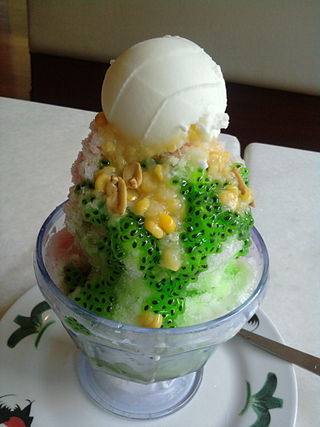
Ais kacang, literally meaning "bean ice", also commonly known as ABC, meaning "mixed ice"), is a Malaysian dessert which is common in Malaysia, Singapore and Brunei.
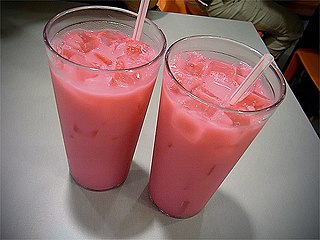
Bandung, sirap bandung, air bandung, iced bandung or rose syrup drink, is a drink popular in Maritime Southeast Asia, notably in Brunei, Indonesia, Malaysia and Singapore. It consists of evaporated milk or condensed milk flavoured with rose syrup, giving it a pink colour.

Cendol is an iced sweet dessert that contains droplets of green rice flour jelly, coconut milk and palm sugar syrup. It is commonly found in Southeast Asia and is popular in Indonesia, Malaysia, Brunei, Cambodia, East Timor, Laos, Vietnam, Thailand, Singapore, and Myanmar. Next to the green jelly, additional toppings might be added, including diced jackfruit, sweetened red azuki beans, or durian.

Sugarcane juice is the liquid extracted from pressed sugarcane. It is consumed as a beverage in many places, especially where sugarcane is commercially grown, such as Southeast Asia, the Indian subcontinent, North Africa, and Latin America. Sugarcane juice is obtained by crushing peeled sugar cane in a mill and is one of the main precursors of rum.

Lupis is an Indonesian traditional sweet cake made of glutinous rice, banana leaves, coconut, and brown sugar sauce. Lupis is one of many glutinous rice desserts from Indonesia. Lupis are sometimes cylindrically shaped like Lontong. Lupis is usually eaten with thick palm sugar syrup and with shredded coconut toppings. Often eaten at breakfast or as a side dish during the evening, lupis is often sold at traditional marketplaces throughout Indonesia and is a popular food found nationwide, but especially in middle and eastern Java as well as West Sumatra. Lupis is one of the top desserts that tourists who visit Purwokerto in Java seek.

Grattachecca is a shaved ice originating in Rome, Italy. Commonly sold in kiosks and bars as street food, it consists of hand-shaved ice topped with various flavors of sweet syrup. In contemporary times, some grattachecca vendors use a mechanical ice crusher, rather than shaving or grating the ice by hand. Some vendors believe that using a machine is more hygienic compared to hand shaving the ice.

Serabi (ꦱꦼꦫꦧꦶ), surabi (ᮞᮥᮛᮘᮤ), or srabi (ᬲ᭄ᬭᬩᬶ) is a traditional Balinese–Javanese snack, similar to a pancake, made of a rice flour-based batter with coconut milk or coconut cream and shredded coconut as an emulsifier. Most traditional serabi tastes sweet, as these pancake-like desserts are usually eaten with kinca (ᮊᮤᮑ᮪ᮎ), a golden-brown coconut sugar syrup in the Sundanese culinary tradition.

Es teler is an Indonesian fruit cocktail. Avocado, coconut meat, grass jelly, jackfruit and other fruits are served with coconut milk, sweetened condensed milk, Pandanus amaryllifolius leaf, sugar, and a tiny amount of salt.

Sundanese cuisine is the cuisine of the Sundanese people of Western Java, and Banten, Indonesia. It is one of the most popular foods in Indonesia. Sundanese food is characterised by its freshness; the famous lalab eaten with sambal and also karedok demonstrate the Sundanese fondness for fresh raw vegetables. Unlike the rich and spicy taste, infused with coconut milk and curry of Minangkabau cuisine, the Sundanese cuisine displays the simple and clear taste; ranged from savoury salty, fresh sourness, mild sweetness, to hot and spicy.
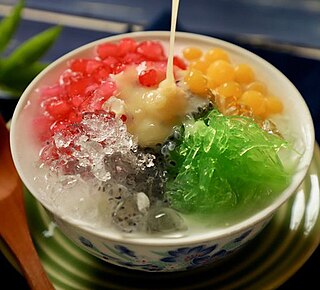
Es campur is an Indonesian cold and sweet dessert concoction of fruit cocktails, coconut, tapioca pearls, grass jellies, etc. served in shaved ice, syrup and condensed milk.

Namkhaeng sai is a Thai version of shaved ice or snow cone. It is also known as wan yen or chamba. Namkhaeng sai is simply shaved ice in a bowl, poured on top with sweet syrup and condensed milk

Es doger is an Indonesian coconut milk-based shaved ice beverage with pinkish color often served as a dessert. It is a specialty of Bandung, West Java. The main, or base, part is sugared sweet coconut milk-based ice in pink syrup, served with pacar cina merah delima, avocado, cassava tapai, ketan hitam tapai, jackfruit, diced bread and condensed milk. The condensed milk can be plain (white), or chocolate flavoured. Es doger gains its pinkish color from rozen (rose) syrup, cocopandan syrup, or pink food coloring. Es doger is commonly sold by travelling vendor carts in major Indonesian cities, mainly in Bandung, Jakarta, Malang and Surabaya.

Es goyobod is an Sundanese drink from Indonesia. The origin of coconut milk based cold beverage similar to es campur. It is made with shaved ice, coconut milk, sugar syrup, and jellied mung bean starch known as hunkwe. Other ingredients may include avocado and shredded coconut.

Es buah is an Indonesian iced fruit cocktail dessert. This cold and sweet beverage is made of diced fruits, such as honeydew, cantaloupe, pineapple, papaya, squash, jackfruit and kolang kaling, mixed with shaved ice or ice cubes, and sweetened with liquid sugar or syrup. The type of fruit used in this dessert may vary, some might add any available fruits such as mango, watermelon or longan — some imported fruits — such as lychee, kiwi, strawberry, pear, peach or grapes. Other ingredients might be added too, such as agar-agar jelly, grass jelly, seaweed or nata de coco.

Es kelapa muda is a beverage made from chilled or iced coconut water, young coconut flesh and syrup. It is among the most popular beverages in Indonesia. Es kelapa muda is included in the world's 50 most delicious drinks according to CNN on December 9, 2011, ranking 19th.
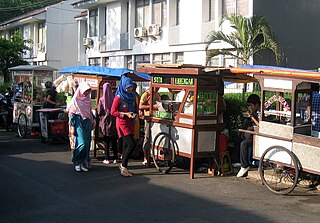
Indonesian street food is a collection of ready-to-eat meals, snacks, fruits and drinks sold by hawkers or vendors at warung food stalls or food carts. Street food in Indonesia is a diverse mix of local Indonesian, Chinese, and Dutch influences. Indonesian street food are usually cheap, offer a great variety of food of different tastes, and can be found on every corner of the city.

Madurese cuisine is the culinary tradition of the Madurese people from Madura Island in Indonesia. This cuisine is particularly well-known in the neighboring areas of East Java, as well as on the south coast of Kalimantan. As a leading salt production center in the Indonesian archipelago, Madurese dishes are often saltier compared to Eastern Javanese cuisine, although with significant Javanese influences.
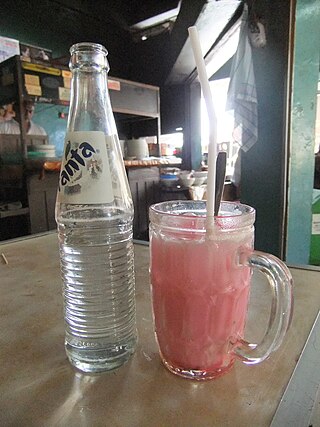
Soda gembira is an Indonesian drink. It is made up of carbonated water / Strawberry Fanta, condensed milk, syrup and ice.
References
- ↑ Hanna, Yomi. "Kenapa sirup cocopandan warnanya merah?". bobo.grid.id (in Indonesian). Retrieved 7 November 2022.